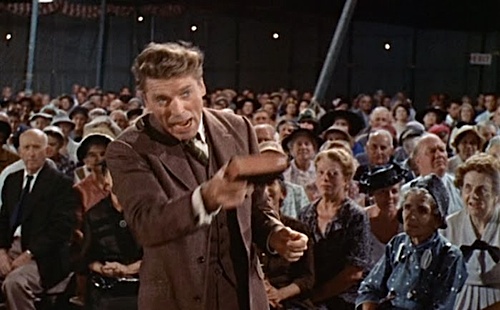
Many of humanity’s cynics consider the cross, death, and resurrection “narrative” of Christianity a deeply rooted myth. And for them, so is the forgiveness Christianity promises them. Sunday’s readings expand on the forgiveness that Jesus modeled throughout his earthly ministry—up to his death on the cross. His disciples—especially Peter—learned that forgiveness must start with oneself, because it requires awareness of our own faults.
Humanity’s original sin is the childish evil that grows from the grave of our childlike innocence we killed off. One of the best cinematic explorations of resurrection from that grave is Elmer Gantry, starring Burt Lancaster. It’s the story of a phony preacher who uses people’s belief in Christianity to profit from being a “prophet.” The novel on which the film is based sums up this character in one sentence: “He had, in fact, got everything from church and Sunday school, except, perhaps, any longing whatever for decency and kindness and reason.”
In the film, after joining up with and managing evangelist Sharon Falconer, Elmer Gantry falls in love with her. In the process of this character’s evolution, he seems to develop a sense of “other” after experiencing the consequences of his past selfishness. That’s demonstrated by his saving a woman who tried blackmailing him for his misdeeds. As she is beaten by a mob boss who doesn’t like how she handled the blackmail attempt, Gantry pulls the gangster off of her and says “Don’t you know that hurts?”
Sunday’s gospel reading (MT 18:21-35) gives a story of forgiveness that’s no less dramatic. Jesus tells of the servant who begs his master to forgive his debts. “Be patient with me, and I will pay you back in full,” he vows. Moved with compassion the master forgives the debt entirely. But when that master learns his servant refused the same kindness to someone owing money to him, he confronts the hypocrite. “Should you not have had pity on your fellow servant, as I had pity on you?” he asks.
The moral: Forgive your brother. And although that servant suffered consequences at the hands of his angry master for not doing so, OUR master would prefer a repentance that comes from the heart rather than a gut fear. That’s not as easy as it sounds to someone whose human nature finds pleasure in vengeance. As Sunday’s first reading states (SIR 27:30), “Wrath and anger are hateful things, yet the sinner hugs them tight.”
There’s no better example of someone whose change of heart gave him the strength to release his grip on those comforting sins than Paul of Tarsus. Sunday’s second reading from St. Paul to the Romans (ROM 14:7-9) might as well be addressed to us 21st century Elmer Gantries. He helps us change our motivation from self- to other-centered:
None of us lives for oneself, and no one dies for oneself. For if we live, we live for the Lord, and if we die, we die for the Lord … For this is why Christ died and came to life, that he might be Lord of both the dead and the living.
We are called to put to death the childish self that buried the first Adam and to resurrect the child-like innocence the second Adam modeled for us.
Let’s conclude with Elmer Gantry’s happy cinematic ending. After losing the woman he fell in love with, Sharon Falconer, to a fire started during a revival meeting he was instrumental in arranging, Gantry seems to finally recognize and reject the self-serving childish ambitions on which his ego thrived. When asked by a newspaper reporter if he would continue the ministry he knew was more for profit than prophecy, Gantry quotes this scripture from St. Paul: “When I was a child, I understood as a child and spake as a child. When I became a man, I put away childish things.”
This character’s transformation from childish self-service to childlike rebirth models for us the necessary journey of forgiveness we are all called to live—from inside out.
–Tom Andel